Barbara Paganin – Scrivo così i miei racconti 2/2
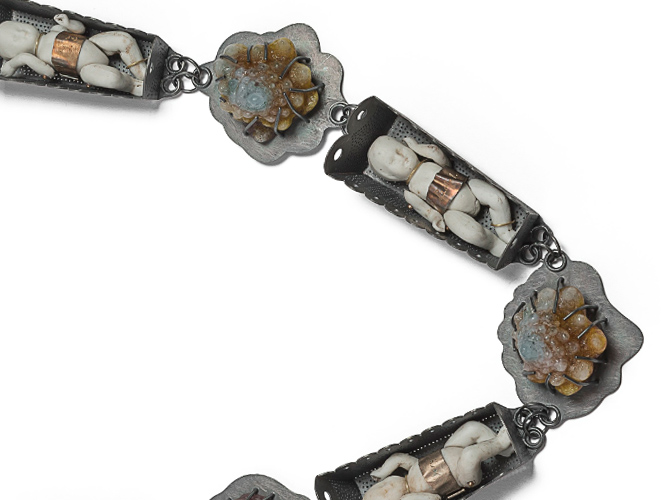
 Come promesso eccomi a presentarvi le altre quattro spille che fanno parte di Memoria Aperta Catarsi in mostra alla galleria olandese Marzee in questi giorni. Qui sotto stralci dei testi scritti da Barbara Paganin per illustrare questo lavoro.
Come promesso eccomi a presentarvi le altre quattro spille che fanno parte di Memoria Aperta Catarsi in mostra alla galleria olandese Marzee in questi giorni. Qui sotto stralci dei testi scritti da Barbara Paganin per illustrare questo lavoro. This is how I write my stories 2/2
This is how I write my stories 2/2As I promised, here are the other four art pieces that belong to Memoria Aperta. Catarsi in these days on display at the Dutch Gallery Marzee. Here are some of Barbara Paganin’s notes that describe her work.
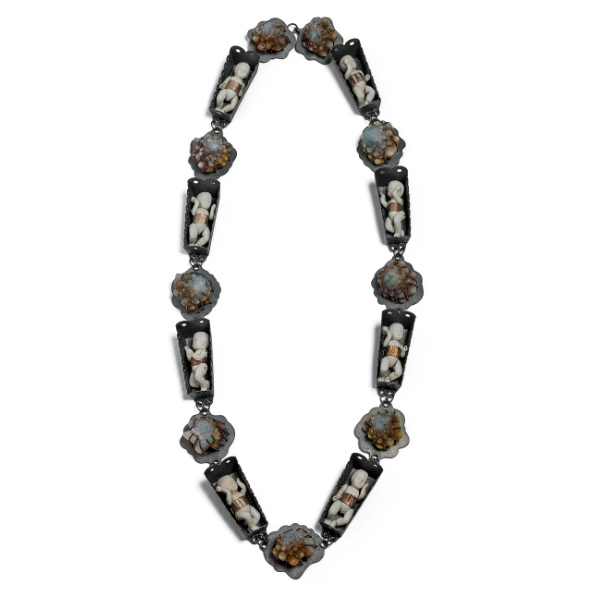
“Sotto il Cavolo” per intero, Barbara Paganin
“Found in the cabbage patch”, by Barbara Paganin
 Perché si dice che i bambini nascono sotto i cavoli? Simbolo di vita e di fecondità veniva seminato in marzo e raccolto dopo nove mesi in novembre, come accade con la gestazione dei bambini.
Perché si dice che i bambini nascono sotto i cavoli? Simbolo di vita e di fecondità veniva seminato in marzo e raccolto dopo nove mesi in novembre, come accade con la gestazione dei bambini.
“Sotto il Cavolo“ è formata da otto culle che potrebbero essere anche delle piccole bare.
Questa composizione può riportare alla memoria i fregi con putti, ghirlande e frutta che incorniciano le stanze in molte Ville venete, luoghi che indubbiamente contagiano la mia immaginazione.
 It is said that babies are found in the cabbage patch. This is because cabbages are seen as a symbol of life and prosperity; they are seeded in March and harvested nine months later in November, just like babies.
It is said that babies are found in the cabbage patch. This is because cabbages are seen as a symbol of life and prosperity; they are seeded in March and harvested nine months later in November, just like babies.
“Found in the cabbage patch” is made of eight cradles that could also resemble small coffins.
This composition recalls those decorations with little angels, wreaths and fruits that adorn the halls of many Venetian villas, an environment that has certainly spurred my imagination.
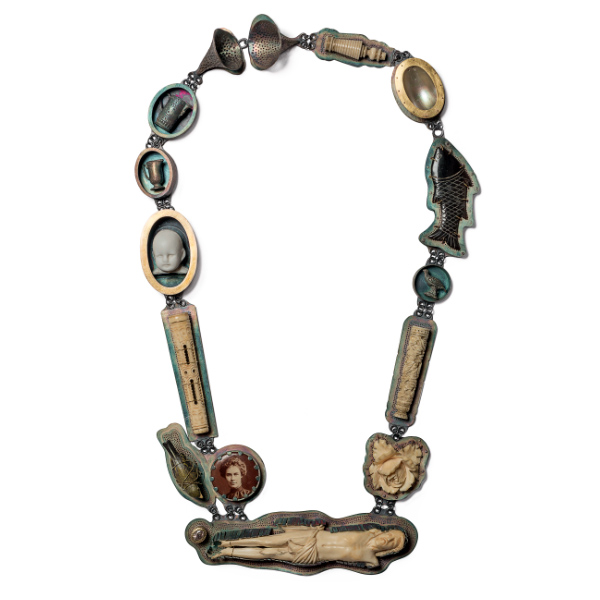
“Rosario”, Memoria Aperta Catarsi, Barbara Paganin
“Rosary”, Memoria Aperta. Catarsi, Barbara Paganin
 “Rosario” è un lavoro più complesso dove la decisione di usare il corpo di Cristo in avorio che fu di un antico crocifisso, e porlo orizzontalmente all’interno di una cesta d’argento, ha richiesto notevole coraggio.
“Rosario” è un lavoro più complesso dove la decisione di usare il corpo di Cristo in avorio che fu di un antico crocifisso, e porlo orizzontalmente all’interno di una cesta d’argento, ha richiesto notevole coraggio. “Rosary” is a more complex work where the decision of using an ivory body of Christ, that once belonged to an ancient crucifix and of positioning it horizontally in a silver basket, was extremely daring.
“Rosary” is a more complex work where the decision of using an ivory body of Christ, that once belonged to an ancient crucifix and of positioning it horizontally in a silver basket, was extremely daring.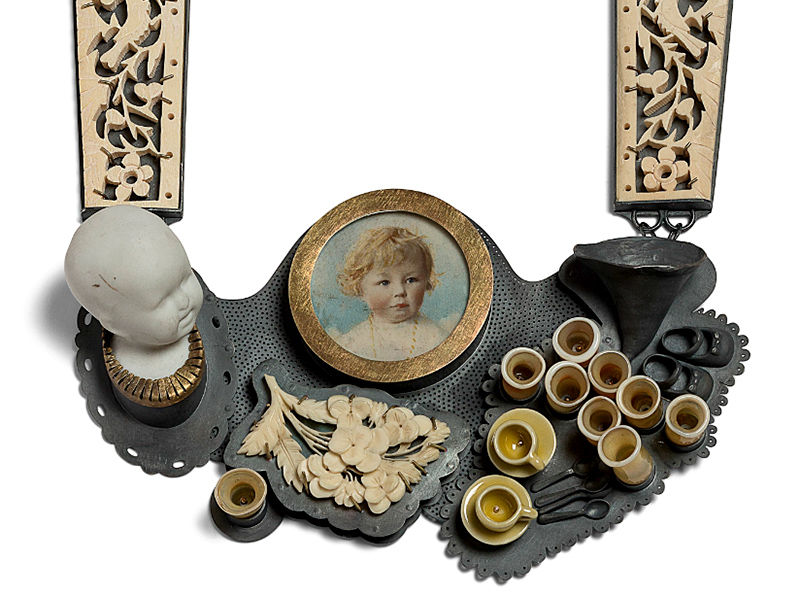
Il particolare centrale di “Nontiscordardime”, Barbara Paganin
Central detail of “Forget-me-not”, Barbara Paganin
 “Nontiscordardime”, non ti dimenticare di me! Il ritratto, miniatura su avorio di un bambino, è l’elemento principale di questo lavoro e tutto il resto rappresenta il mondo dell’infanzia: le tazzine, i cucchiaini, le scarpette, i piccoli piatti d’argento. I piccoli bicchieri in vetro opalino giallo e avorio soffiato a lume, sono i vasi alchemici, contenitori dell’anima.
“Nontiscordardime”, non ti dimenticare di me! Il ritratto, miniatura su avorio di un bambino, è l’elemento principale di questo lavoro e tutto il resto rappresenta il mondo dell’infanzia: le tazzine, i cucchiaini, le scarpette, i piccoli piatti d’argento. I piccoli bicchieri in vetro opalino giallo e avorio soffiato a lume, sono i vasi alchemici, contenitori dell’anima. “Forget-me-not”! The portrait, a child’s ivory miniature, is the main element of this art piece. All the other elements represent childhood: the small cups, the spoons, the tiny shoes and the small silver plates. The small yellow opaline and ivory lampworking glasses are the alchemical vessels that preserve the soul.
“Forget-me-not”! The portrait, a child’s ivory miniature, is the main element of this art piece. All the other elements represent childhood: the small cups, the spoons, the tiny shoes and the small silver plates. The small yellow opaline and ivory lampworking glasses are the alchemical vessels that preserve the soul.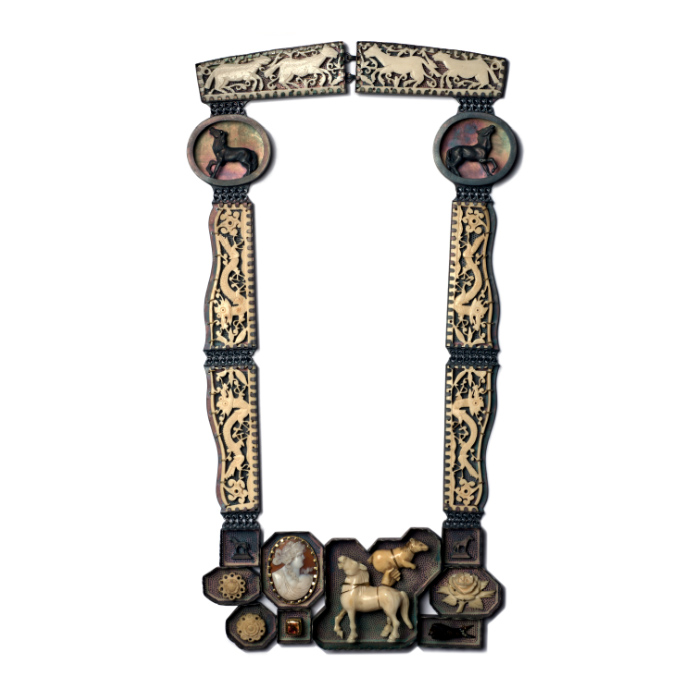
“In Sartoria”, Memoria Aperta Catarsi, Barbara Paganin
“In the tailor’s shop”, Memoria Aperta Catarsi, Barbara Paganin
 La sartoria era un luogo dove mi piaceva stare, dove mi sentivo a mio agio. C’erano tanti oggetti interessanti : uno specchio con la cornice a forma di drago mi affascinava particolarmente, poi i bottoni, le stoffe decorate, un balcone fiorito dal quale osservavo le rondini volare e nell’insieme un sapore di antico resta nei miei ricordi.
La sartoria era un luogo dove mi piaceva stare, dove mi sentivo a mio agio. C’erano tanti oggetti interessanti : uno specchio con la cornice a forma di drago mi affascinava particolarmente, poi i bottoni, le stoffe decorate, un balcone fiorito dal quale osservavo le rondini volare e nell’insieme un sapore di antico resta nei miei ricordi. The tailor’s shop was a place I loved, in which I felt at ease. There were so many interesting objects: a mirror with a dragon-shaped frame to which I was particularly attracted to, the buttons, the decorated fabrics, a flowered balcony from which I watched the swallows fly by. Overall, it reminds me of something antique.
The tailor’s shop was a place I loved, in which I felt at ease. There were so many interesting objects: a mirror with a dragon-shaped frame to which I was particularly attracted to, the buttons, the decorated fabrics, a flowered balcony from which I watched the swallows fly by. Overall, it reminds me of something antique.
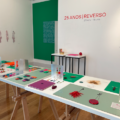
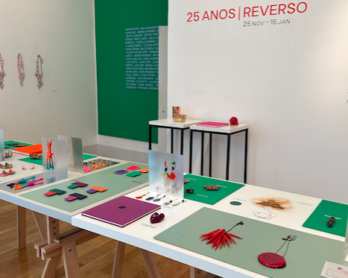
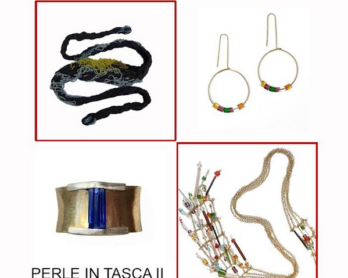
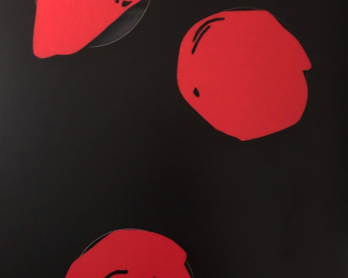
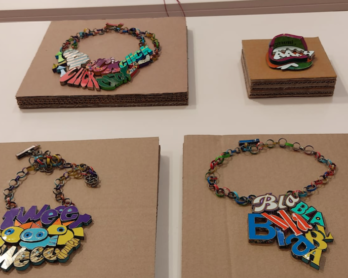

Discussion about this post